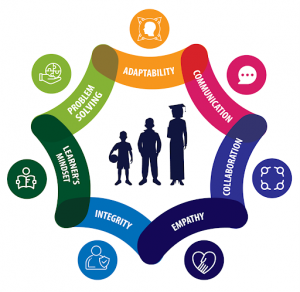Education for 21st Century Skills: Preparing for the Future
BEST CAREER COUNSELLOR FOR STUDENTS IN DELHI NCR
In a rapidly changing world driven by technological innovation and global interconnectedness, the education system must evolve to meet the demands of the 21st century. The traditional model of education, focused largely on rote memorization and standardized testing, no longer adequately prepares students for the complexities and challenges they will face in the modern workforce and society. Instead, the focus must shift toward developing 21st century skills, which encompass a broad range of competencies, including critical thinking, creativity, communication, collaboration, and digital literacy. These skills are essential not only for success in the workplace but also for active participation in civic life and the ability to navigate the challenges of a globalized world.
The Importance of 21st Century Skills
The world is changing faster than ever before. From technological advancements to shifts in global economics, the future is unpredictable. Traditional jobs are being replaced by automation, and new jobs are being created that require skills that were not in demand even a decade ago. The World Economic Forum’s “Future of Jobs” report highlights the rising importance of skills such as problem-solving, creativity, critical thinking, and emotional intelligence in the workforce of the future.
For individuals to succeed in this dynamic environment, they need to be equipped with skills that enable them to think critically, adapt quickly to new technologies, collaborate with diverse teams, and communicate effectively across cultures. These are precisely the kinds of competencies encompassed by 21st century skills.
Top career counseling for students in North Delhi: Rohini, Pitampura, and Shalimar Bagh
Key 21st Century Skills
- Critical Thinking and Problem-Solving
At the core of 21st century skills is the ability to think critically and solve complex problems. In a world where information is abundant and often overwhelming, the capacity to evaluate, analyze, and synthesize information is crucial. Critical thinking empowers individuals to make informed decisions, identify biases, and question assumptions. This is essential not only in professional settings but also in everyday life, where individuals must navigate a sea of information and make decisions that can affect their personal and professional lives.
Problem-solving skills are equally important. The ability to approach problems creatively, identify solutions, and implement them effectively is a valuable asset in any field. Whether solving a technical issue, developing a new product, or addressing a social challenge, problem-solving skills are indispensable.
- Creativity and Innovation
Creativity is no longer reserved for artists and musicians. In the 21st century, creativity is a vital skill in all sectors of society, from business to technology to healthcare. The ability to generate new ideas, think outside the box, and innovate is what drives progress in today’s world. Creativity allows individuals to approach challenges from different angles, develop novel solutions, and adapt to change with agility.
Innovation, closely related to creativity, refers to the implementation of these creative ideas in practical, real-world scenarios. The innovation economy rewards those who can turn visionary ideas into actionable outcomes, and this is where creativity plays a pivotal role.
- Collaboration and Teamwork
In a globalized world where workforces are increasingly diverse and distributed, the ability to collaborate effectively is more important than ever. Whether in person or virtually, individuals need to work together to achieve shared goals. This requires communication, empathy, and the ability to compromise and listen to others.
Collaboration also involves understanding and respecting diverse perspectives. As teams become more global, the ability to work across cultures, languages, and time zones becomes increasingly valuable. Fostering a collaborative mindset in students not only enhances their ability to work with others but also teaches them to value diversity and engage with different ideas and viewpoints.
- Communication Skills
Strong communication skills are a cornerstone of success in the 21st century. In a world where information flows at lightning speed, being able to convey ideas clearly and persuasively is essential. This involves both verbal and written communication, as well as non-verbal cues such as body language and tone of voice.
Effective communication extends beyond simply transmitting information; it also involves listening actively and responding thoughtfully. In professional environments, the ability to communicate with colleagues, clients, and stakeholders can determine the success of a project or the outcome of a negotiation. Moreover, in an increasingly digital world, communication skills also encompass digital literacy—the ability to navigate various online platforms, create digital content, and engage in digital conversations.
Best career counseling services in South Delhi: Hauz Khas, Saket, and Greater Kailash
- Digital Literacy
In the 21st century, digital literacy is a non-negotiable skill. Technology is integral to virtually every aspect of modern life, from work to education to social interactions. Being digitally literate means having the ability to use technology effectively and responsibly, including navigating digital tools, understanding the ethics of technology, and being able to critically evaluate online content.
Digital literacy also involves understanding the implications of technology on privacy, security, and personal identity. As students become more immersed in the digital world, it is essential to equip them with the skills necessary to protect their information, maintain their online reputation, and use technology in a way that enhances their lives without exposing them to unnecessary risks.
Best career counseling services in West Delhi: Janakpuri, Rajouri Garden, and Punjabi Bagh
- Global Awareness and Citizenship
The interconnectedness of the modern world means that students must develop a sense of global awareness and an understanding of how their actions impact the wider world. Global citizenship involves being aware of global issues such as climate change, poverty, and social justice, and understanding how these issues relate to one’s local context.
By fostering a sense of global responsibility, students are better equipped to become proactive, compassionate citizens who can contribute to solving the world’s most pressing challenges. This includes cultivating empathy for people from different backgrounds and understanding the importance of sustainable practices in a rapidly changing world.
- Social and Emotional Learning (SEL)
In addition to technical and intellectual skills, social and emotional learning (SEL) plays a critical role in the development of 21st century skills. SEL encompasses the ability to recognize and manage one’s emotions, understand and relate to the emotions of others, and build positive relationships. It also involves making responsible decisions, setting and achieving goals, and persevering through challenges.
In a world where mental health concerns are increasingly prevalent, SEL helps students build resilience, emotional intelligence, and empathy. These traits not only support personal well-being but also enhance professional success, as individuals with strong SEL skills tend to work well in teams, communicate effectively, and manage stress more efficiently.
How Education Systems Can Support 21st Century Skills
To ensure that students are equipped with the skills necessary for success in the 21st century, education systems must undergo significant changes. The following are strategies that schools and educational institutions can implement to foster these skills:
- Project-Based Learning (PBL)
Project-based learning is an instructional approach that encourages students to work on real-world projects and problems, often in collaborative teams. PBL emphasizes inquiry, creativity, and problem-solving, allowing students to apply their knowledge to authentic challenges. This approach not only helps students develop critical thinking skills but also encourages collaboration, communication, and creativity.
- Technology Integration
Integrating technology into the curriculum can enhance learning experiences and prepare students for the digital world. By using technology to access information, collaborate with peers, and create digital content, students become more digitally literate and adept at using the tools that will define the future workforce. Technology can also support personalized learning, allowing students to work at their own pace and receive targeted feedback.
- Soft Skills Development
While academic content is important, soft skills such as communication, teamwork, and problem-solving must also be prioritized. These skills can be developed through activities such as group discussions, debates, role-playing, and collaborative projects. Encouraging students to take leadership roles and engage in community service can also foster social and emotional development.
- Fostering a Growth Mindset
A growth mindset, the belief that abilities and intelligence can be developed through effort and perseverance, is crucial for success in the 21st century. Schools can encourage this mindset by emphasizing the importance of effort, resilience, and learning from mistakes. Teachers can model this approach and create an environment where students feel safe to take risks, experiment, and learn from their experiences.
- Curriculum Reformation
The traditional curriculum, with its focus on memorizing facts and passing tests, needs to be reformed to prioritize skills development. Instead of merely imparting knowledge, educators should focus on teaching students how to think critically, solve problems, collaborate, and communicate effectively. This can be achieved by integrating interdisciplinary learning, allowing students to see connections between subjects, and encouraging inquiry-based learning.
- Emphasizing Lifelong Learning
Given the rapid pace of change, it is essential to cultivate a mindset of lifelong learning in students. The ability to adapt to new information and continuously acquire new skills will be key to success in the future. Schools can promote lifelong learning by encouraging curiosity, providing opportunities for self-directed learning, and fostering a love of learning that extends beyond the classroom.
Best career counseling services in East Delhi: Laxmi Nagar, Preet Vihar, and Mayur Vihar.
Conclusion
In the 21st century, education must go beyond preparing students for traditional careers and focus on equipping them with the skills necessary to thrive in a complex, fast-changing world. Critical thinking, creativity, collaboration, communication, digital literacy, and emotional intelligence are no longer optional—they are essential for personal and professional success. By embracing innovative teaching methods, integrating technology, and fostering a growth mindset, education systems can help students develop the skills they need to become responsible, adaptive, and successful citizens of the world. Ultimately, preparing students for the future requires not just teaching content but nurturing the capabilities that will empower them to navigate the challenges and opportunities of the 21st century.











